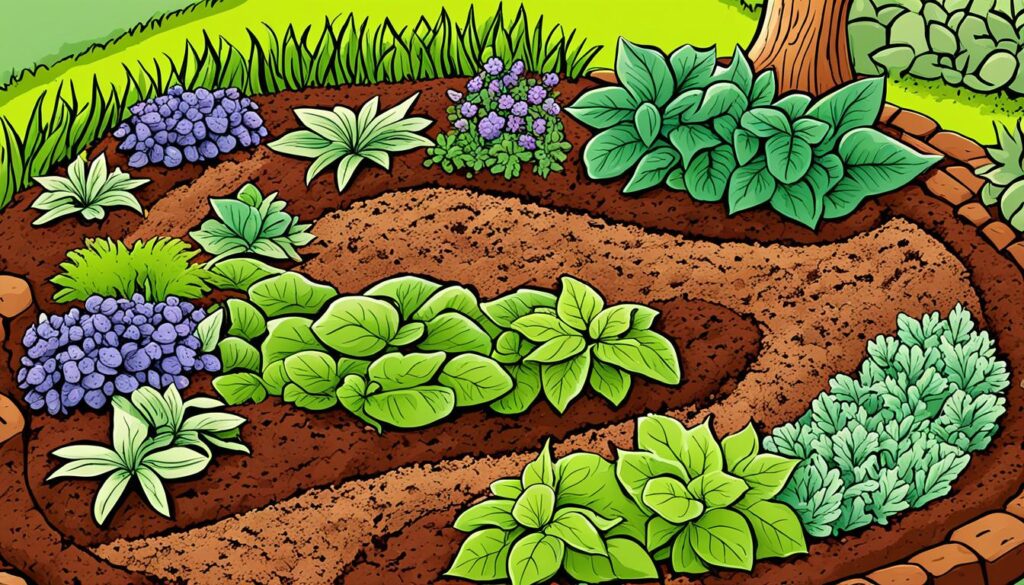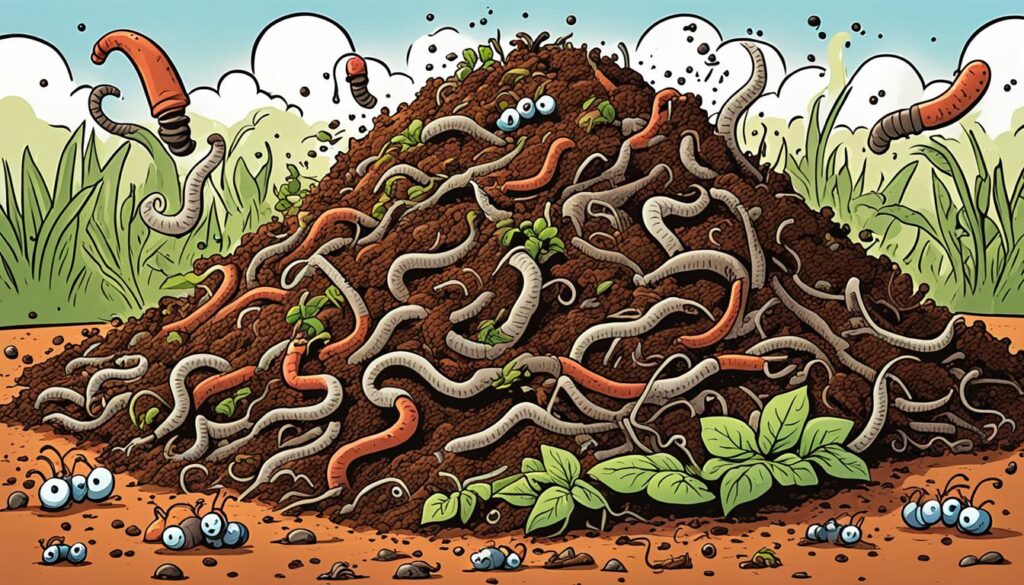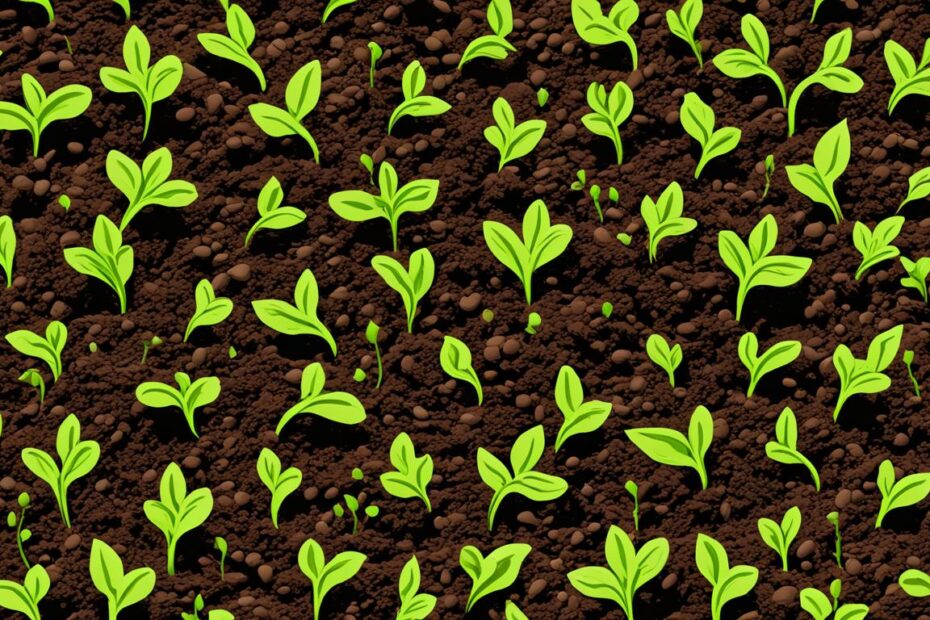Do you want your garden to thrive with vitality and produce healthy, abundant plants? The secret lies in the quality of your soil. Organic soil, enriched with organic matter, is the foundation of a flourishing garden. But what exactly is organic soil, and how does it benefit your plants? Let’s dig deep and uncover the answers.
Key Takeaways:
- Organic soil is essential for a thriving garden and healthy plant growth.
- Incorporating organic soil amendments like compost, manure, and mulch can enhance the fertility and structure of your garden soil.
- Mulching helps control weeds, conserve moisture, and improve soil health in organic gardening.
- Understanding the basics of composting allows you to create nutrient-rich compost for your garden.
- Exploring alternative composting methods like vermicomposting and smart composters can simplify and enhance the composting process.
Why Organic Soil Amendments are Crucial for Healthy Plants
In order to cultivate a vibrant and thriving garden, it is essential to understand the significance of organic soil amendments. These amendments, which include compost, manure, and other organic fertilizers, play a vital role in providing essential nutrients to plants and improving the overall structure of the soil.
Compost is the cornerstone of organic gardening. It is created through the decomposition of organic matter such as kitchen scraps, leaves, and grass clippings. This natural process transforms these materials into nutrient-rich, organic matter that nourishes the soil and supports healthy plant growth.
The Benefits of Compost:
- Enhances soil fertility
- Improves soil structure and moisture retention
- Increases microbial activity
- Reduces the need for chemical fertilizers
- Encourages beneficial soil organisms
Another valuable organic fertilizer is manure, which can be sourced from various animals including cows, horses, goats, rabbits, and chickens. Manure provides essential nutrients to the soil and promotes healthy plant growth. When properly aged and composted, manure becomes a safe and beneficial addition to your garden.
Organic gardening also offers a range of other organic fertilizers to supplement soil nutrient content. Fish emulsion, seaweed extract, bone meal, and comfrey are just a few examples of these natural alternatives. These organic fertilizers can be used to meet specific nutrient needs based on your plants’ requirements.
“Organic soil amendments, such as compost and manure, are the building blocks of a healthy garden.”
| Organic Soil Amendment | Benefits |
|---|---|
| Compost |
|
| Manure |
|
| Other Organic Fertilizers |
|
By incorporating organic soil amendments into your gardening practices, you can create a nutrient-rich and balanced soil environment that supports optimal plant growth. Organic matter improves soil structure, increases nutrient availability, and encourages beneficial microorganisms, ensuring a bountiful and healthy garden.
The Benefits of Mulching in Organic Gardening
Mulching is an essential practice in organic gardening that offers numerous benefits for your garden’s health and vitality. By incorporating mulch, such as straw, hay, or shredded newspaper, around your plants, you can effectively control weeds, conserve moisture, and improve the overall quality of your soil.
Mulching acts as a natural barrier, preventing weed growth by blocking out sunlight and inhibiting weed germination. This reduces the competition for nutrients and resources, allowing your plants to thrive and flourish without interference from unwanted plants. Additionally, mulch helps to retain soil moisture by reducing evaporation, ensuring that your plants have consistent access to water throughout the growing season.
Another advantage of mulching is its ability to improve soil health. As the mulch gradually decomposes, it adds valuable organic matter to the soil, enhancing its structure and fertility. The organic matter acts as a sponge, improving the soil’s ability to absorb and retain water, while also promoting beneficial microbial activity and nutrient cycling. This creates an optimal environment for plant roots to grow deep and strong, resulting in healthier and more resilient plants.
Effective Mulching Practices
To maximize the benefits of mulching, it is important to follow proper mulching practices:
- Prepare the soil: Before applying mulch, ensure that the soil is properly prepared by removing any existing weeds and loosening it to improve drainage and aeration.
- Space out plants: Leave sufficient space between plants to allow for air circulation and to prevent moisture buildup, which can lead to fungal diseases.
- Mulch after seedlings emerge: It is recommended to wait until seedlings have emerged before applying mulch. This allows for easier thinning and promotes the growth of the strongest plants.
- Avoid direct contact with stems: When mulching around plants, be careful not to allow the mulch to come into direct contact with the stems. This helps prevent diseases and pest infestations.
- Replenish mulch as needed: Throughout the growing season, monitor the mulch layer and replenish it if it becomes thin or decomposes. This ensures that weeds are continually suppressed and moisture retention is maximized.

At the end of the growing season, the mulch can be tilled back into the soil, further enriching it with organic matter and nutrients. This practice helps to improve the soil’s moisture retention and workability, setting the stage for a healthy start in the next growing season.
In conclusion, incorporating mulch into your organic gardening practices is not only beneficial for controlling weeds and conserving moisture but also for enhancing the overall health and fertility of your soil. By following effective mulching practices, you can create an environment that nurtures the growth of your plants, resulting in a vibrant and thriving garden.
CLICK HERE TO CHECK OUR RECOMMENDED PRODUCTSEnhancing Soil Health for Organic Gardens
Soil quality plays a crucial role in the success of your organic gardening endeavors. The health and fertility of your soil directly impact the growth and yield of your plants. To ensure optimal results, it is important to prioritize soil testing and maintaining healthy soil without the use of chemical fertilizers.
Soil Quality and Its Impact
Achieving healthy soil is vital for organic gardening. Soil quality refers to the composition and nutrient content of the soil. It determines the availability of essential nutrients for plant uptake and influences soil structure, water retention, and microbial activity. Healthy soil provides a favorable environment for plant growth, enhancing their ability to resist diseases and pests.
“Good soil is the foundation of a thriving garden. It provides the necessary nutrients and conditions for plants to flourish.”
To assess soil quality, soil testing is essential. By understanding the composition of your soil, you can identify any deficiencies and make targeted amendments to improve its fertility and structure.
Soil Testing for Nutrient Analysis
Soil testing involves taking samples of your garden soil and sending them to a local extension office or a reputable soil testing laboratory. This analysis provides valuable information about the nutrient content and pH levels of your soil.
Based on the results, you can make informed decisions about amending your soil to address any deficiencies or imbalances. This targeted approach ensures that your plants receive the necessary nutrients for healthy growth without relying on synthetic fertilizers.
The Benefits of Healthy Soil
Investing time and effort into enhancing soil health brings numerous benefits to your organic garden:
- Promotes optimal plant growth and development
- Enhances nutrient availability for plants
- Increases water retention, reducing irrigation needs
- Improves soil structure and aeration
- Supports beneficial soil microorganisms
- Reduces the risk of soil erosion
Improving Soil Quality
Once you have identified the specific needs of your soil through testing, you can take targeted steps to improve its quality. The following techniques and amendments can help enhance soil health:
- Organic Matter: Adding compost, leaf mold, or well-rotted manure improves soil structure, increases nutrient content, and enhances moisture retention.
- Cover Crops: Planting cover crops like legumes, grasses, or clover during fallow periods or between main crop seasons helps prevent soil erosion and adds organic matter.
- Mulching: Applying organic mulch, such as straw or shredded leaves, helps with weed control, moisture retention, and temperature regulation.
- Crop Rotation: Regularly rotating the types of crops you grow in different areas of your garden helps reduce soil-borne diseases and replenishes nutrient levels naturally.
Remember, healthy soil is the key to sustainable and successful organic gardening. By prioritizing soil testing and implementing soil improvement techniques, you can create a thriving garden environment that supports the growth of vibrant and productive plants.
Understanding the Basics of Composting for Organic Gardening
Composting is a fundamental aspect of organic gardening. It involves the decomposition of organic materials in a controlled environment to create nutrient-rich compost. By providing the ideal conditions for decomposers like bacteria and worms, you can turn kitchen scraps, garden waste, and other organic materials into valuable compost. This compost can then be used as a soil amendment to enhance the fertility and overall health of your garden soil.

Composting is a natural process that mimics the way organic matter breaks down in nature. In a composting system, you create a balanced environment where microorganisms, insects, and other decomposers can thrive. These decomposers convert organic materials into a nutrient-rich substance known as compost through a process called decomposition.
Key Benefits of Composting:
- Improves soil structure and drainage, leading to healthier plants
- Enhances soil fertility by adding essential nutrients
- Increases moisture retention in the soil, reducing the need for watering
- Reduces the amount of organic waste sent to landfills
- Encourages beneficial organisms and earthworm activity in the soil
Composting is a rewarding and environmentally friendly practice that allows you to recycle your organic waste while improving the health of your garden. Whether you have a small backyard or a large garden, there’s a composting method suitable for your needs.
Composting is like a natural alchemy that transforms organic waste into black gold for your garden. It’s a simple yet powerful way to nourish your plants and contribute to the sustainability of our planet.
Types of Composting Methods:
| Composting Method | Description |
|---|---|
| Backyard Composting | The traditional method of composting that utilizes a compost pile or bin in your backyard. It requires a mix of green and brown materials, regular turning, and proper moisture levels. |
| Vermicomposting | A process that uses worms to break down organic waste. Worm composting can be done indoors or outdoors, making it an excellent option for those with limited space. |
| Bokashi Composting | A fermentation method that uses beneficial microorganisms to break down organic matter. Bokashi composting is ideal for apartments and small spaces. |
Each method has its advantages and considerations, so choose the one that aligns with your gardening goals and available resources.
Regardless of the method you choose, successful composting requires a good balance of organic materials, air circulation, moisture, and time. As you embark on your composting journey, remember that patience and experimentation are key. With each batch of compost you create, you’ll gain valuable insights and refine your composting skills.
CLICK HERE TO CHECK OUR RECOMMENDED PRODUCTSSetting Up and Maintaining a Compost Pile or Bin
To start composting, you need to create a dedicated space in your backyard or garden for your compost pile or bin. This space will serve as the foundation for your composting journey and ensure the success of your organic gardening endeavors.
The container you choose should be bottomless, allowing direct contact between the compost and the soil. This connection promotes the exchange of beneficial microorganisms and allows earthworms to migrate freely, enriching the compost and improving soil structure. Ensure that the container has lids to keep pests out and holes for proper airflow.
| Green Materials | Brown Materials |
|---|---|
| Fruit and vegetable scraps | Leaves |
| Grass clippings | Cardboard |
| Coffee grounds | Eggshells |
A good compost pile consists of a balanced mixture of green and brown materials. Green materials are rich in nitrogen and provide the necessary nutrients, while brown materials are carbon-rich and contribute to the overall structure of the compost. Green materials include fruit and vegetable scraps, grass clippings, and coffee grounds, while brown materials include leaves, cardboard, and eggshells. By combining these materials, you create a compost with the ideal nutrient composition for your plants.
Maintaining the right moisture level is crucial for successful composting. Your compost should be consistently moist, similar to a wrung-out sponge. If it becomes too dry, add water, and if it becomes too wet, add more brown materials. Turning the compost regularly, about once every two weeks, ensures proper aeration and facilitates the decomposition process. With regular turning, your compost will be ready to use in as little as two to three months.
Start your composting journey today by setting up a dedicated space for your compost pile or bin. With the right container, a balanced blend of green and brown materials, and proper maintenance, you’ll be on your way to producing nutrient-rich compost that will nourish your garden and support organic growth.
Exploring Alternative Composting Methods
While traditional compost piles or bins are effective for composting, there are alternative methods that can simplify and enhance the process. By exploring these options, you can find the composting method that best suits your needs and gardening goals.
Compost Bins: Organized and Convenient
A compost bin offers a convenient and organized way to store compost. By using a dedicated container, you can keep your compost contained and easily accessible. Compost bins come in various sizes and designs, allowing you to choose the one that fits your space requirements and aesthetic preferences. They are an excellent option for urban gardeners or those with limited outdoor areas.
Vermicomposting: Speeding up the Process
Vermicomposting is a composting method that utilizes worms to decompose food waste. These diligent workers accelerate the breakdown process and produce nutrient-rich vermicompost. By creating a worm bin and introducing specific species of worms, such as red wigglers, you can transform your kitchen scraps into valuable compost in a relatively short time. Vermicomposting not only provides you with rich compost but also offers the added benefits of worm castings, which enhance plant health and growth.
Smart Composters: An Automated Solution
If you’re looking for a hassle-free composting solution, smart composters are worth considering. These compact containers are designed to be buried in the soil, allowing for automated composting. They often feature aeration systems, moisture monitors, and even solar-powered heaters to optimize the decomposition process. Smart composters can yield nutrient-rich compost without much manual effort, making them a convenient choice for busy individuals or those new to composting.
So whether you prefer the convenience of compost bins, the speed of vermicomposting, or the automation of smart composters, there’s an alternative composting method that can meet your needs. Choose the method that aligns with your goals and available resources, and enjoy the benefits of nutrient-rich compost for your garden.
Conclusion
Organic soil is the key to your gardening success. By prioritizing the importance of organic matter and incorporating organic soil amendments, fertilizers, and mulch, you can transform your garden into a thriving and vibrant environment.
Composting is a valuable practice that allows you to recycle organic waste and create nutrient-rich compost for your garden. Whether you choose traditional composting methods or explore alternative options like vermicomposting or smart composters, the end result will be healthy soil and optimal plant growth.
Embrace the richness of organic soil and witness the transformation as your garden flourishes. With the right knowledge and techniques, you can create an abundant and sustainable garden that not only enhances the beauty of your outdoor space but also provides you with a bountiful harvest of chemical-free produce. Start your organic gardening journey today and experience the joy of gardening success.
FAQ
What is organic soil?
Organic soil is soil that has been enriched with organic matter such as compost, manure, and other organic fertilizers. It is free from chemical additives and provides the essential nutrients and structure required for healthy plant growth.
How do organic soil amendments benefit plants?
Organic soil amendments, such as compost and manure, provide essential nutrients to plants, improve soil structure, and enhance moisture retention. They also promote beneficial microbial activity and create a fertile environment for plants to thrive.
Why is mulching important in organic gardening?
Mulching is crucial in organic gardening as it helps prevent weed growth, conserve moisture, regulate soil temperature, and improve overall soil health. It also acts as a natural weed barrier and reduces the need for chemical weed control methods.
How can I improve the quality of my soil for organic gardening?
To improve your soil’s quality for organic gardening, you can purchase topsoil or have it tested by a local extension office. They can provide guidance on soil composition, fertility, and recommend amendments to enhance its health and nutrient content.
What is composting and why is it important for organic gardening?
Composting is the process of decomposing organic materials in a controlled environment to create nutrient-rich compost. It is important for organic gardening as it recycles organic waste, reduces landfill waste, and produces a valuable soil amendment that enriches the soil and supports plant growth.
How do I set up and maintain a compost pile or bin?
To set up and maintain a compost pile or bin, you need a dedicated space in your backyard or garden. The container should be bottomless with lids and airflow holes. You will need a balanced mixture of green and brown organic materials, regular moisture level maintenance, and turning the pile regularly for aeration.
What are alternative composting methods for organic gardening?
Some alternative composting methods include compost bins, vermicomposting (using worms to decompose food waste), and smart composters (compact containers that automate the composting process). These methods provide efficient and convenient ways to produce nutrient-rich compost for your garden.
What are the benefits of organic soil for gardening success?
Organic soil provides the foundation for gardening success by offering essential nutrients, improved soil structure, and increased moisture retention. It supports optimal plant growth, vibrant foliage, and bountiful harvests. Organic gardening also eliminates the use of chemical fertilizers, ensuring the production of chemical-free and healthier produce.
